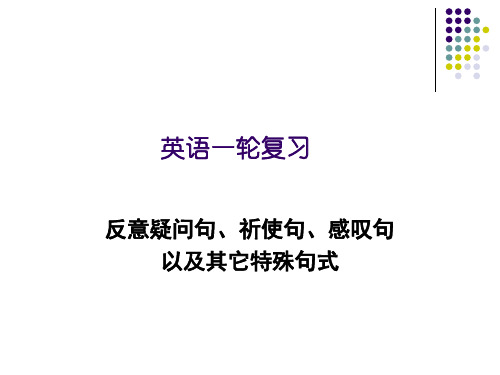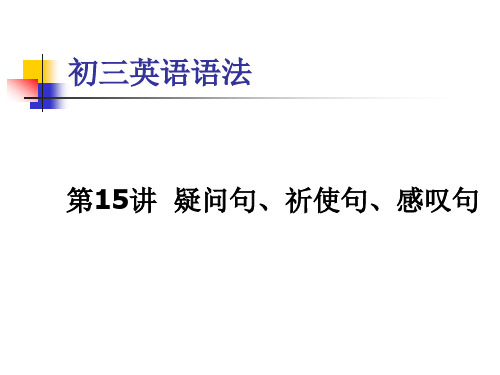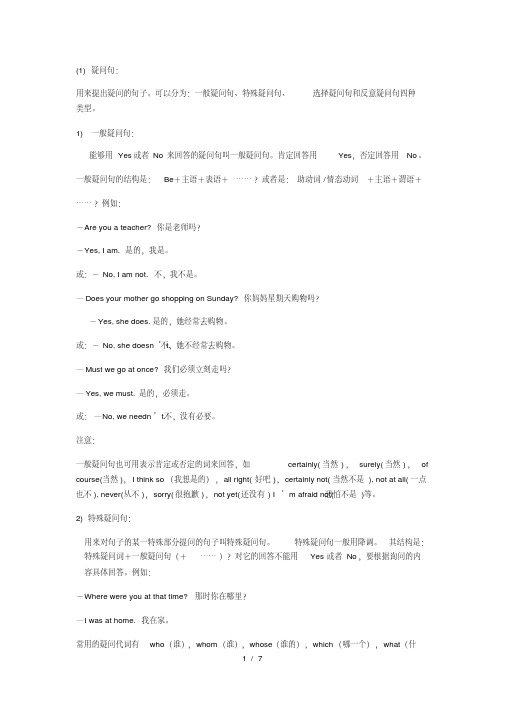祈使句,感叹句,疑问句的用法
- 格式:doc
- 大小:20.50 KB
- 文档页数:3


专题06 句法之感叹句、祈使句、疑问句及其它特殊句式感叹句是历年中考常考的题型,通常以单项选择的形式呈现。
题干不复杂,但更多会注入情景元素来加大考试的难度。
中考考查重点:1.感叹句的基本用法;2.对引导词what 和how 的选择。
祈使句就是表示请求、命令、建议、祝愿、邀请或要求的句子。
其中句首的动词要用原型。
中考考查祈使句类型:1.肯定的祈使句:(1)动词原形+其他/ Do+动词原形+其他,加强语气。
Stand up, please. = Please stand up. /Do e on time!(2)Be + adj.如:Be careful! = Look out! = Take care!(3)Let's + 动词原形如:Let’s go to school together.2.否定的祈使句①Don't + 动词原形Don't stand up./Don't be careless.①Let's + not + 动词原形. Let's not say anything about it.此外,中考英语会少量涉及到特殊疑问句、反义疑问句及倒装句考点。
知识点1:感叹句重难点1. What + a +形容词+名词+其他成分!2. What + an+元音音素开头的形容词+名词+其他成分!3. What +形容词+复数名词+其他成分!4. What +形容词+不可数名词+其他成分!5. What +a+形容词+具体化的抽象名词+其他成分!6. How+形容词+其他成分!7. How+副词+其他成分!8. How+形容词+ +名词+其他成分!9. How+主语+谓语(动词不提前)10. How+主语+谓语+宾语(动词不提前)知识点2:祈使句重难点祈使句的两个重要句型①“祈使句+and+表结果的陈述句”用来叙述肯定的条件。
①“祈使句+or(else)+表结果的陈述句”用来叙述否定的条件。



感叹句和祈使句
感叹句和祈使句
一、感叹句
感叹句(exclamative sentences)又叫感叹语句,可以表达情感,对一件事情、一种状况表示惊讶、恐惧、厌恶、赞赏等。
它一般由“!”、“?!”及其他感叹符号结尾,也可以用某些特定的词结尾。
感叹句的基本句型有:
1、倒装句
How + 形容词/副词 + 主语 + 谓语!
例如:How beautiful the scenery is!
2、陈述句
主语 + 谓语 + 宾语 +!
例如:What a wonderful day it is!
3、疑问句
疑问代词/疑问副词 + 主语 + 谓语 + 宾语 + ?
例如:Who can resist such an offer?
二、祈使句
祈使句(imperative sentences)是表达请求或命令的句子,它可以是一个简单句,也可以是复合句,它常用虚拟语气,一般不用人称代词,经常用动词原形。
- 1 -。

(1)疑问句:用来提出疑问的句子。
可以分为:一般疑问句、特殊疑问句、选择疑问句和反意疑问句四种类型。
1)一般疑问句:能够用Yes或者No来回答的疑问句叫一般疑问句。
肯定回答用Yes,否定回答用No。
一般疑问句的结构是:Be+主语+表语+……?或者是:助动词/情态动词+主语+谓语+……?例如:-Are you a teacher? 你是老师吗?-Yes, I am. 是的,我是。
或:-No, I am not. 不,我不是。
—Does your mother go shopping on Sunday? 你妈妈星期天购物吗?-Yes, she does. 是的,她经常去购物。
不,她不经常去购物。
或:-No, she doesn’t.—Must we go at once? 我们必须立刻走吗?—Yes, we must. 是的,必须走。
或:—No, we needn’t. 不,没有必要。
注意:一般疑问句也可用表示肯定或否定的词来回答,如certainly(当然),surely(当然),of course(当然),I think so(我想是的),all right(好吧),certainly not(当然不是), not at all(一点也不), never(从不),sorry(很抱歉),not yet(还没有) I’m afraid not(恐怕不是)等。
2) 特殊疑问句:用来对句子的某一特殊部分提问的句子叫特殊疑问句。
特殊疑问句一般用降调。
其结构是:特殊疑问词+一般疑问句(+……)?对它的回答不能用Yes或者No,要根据询问的内容具体回答。
例如:-Where were you at that time? 那时你在哪里?—I was at home. 我在家。
常用的疑问代词有who(谁),whom(谁),whose(谁的),which(哪一个),what(什么);疑问副词有when(何时),where(何地),why(为什么),how(如何)以及“how+形容词”构成的短语。
祈使句、感叹句英语句子按其使用目的来分类可以分为陈述句、疑问句、祈使句和感叹句四大类型。
祈使句作为这四大类型之一,有其特有的用法和表达形式。
为了帮助同学们系统掌握祈使句的有关知识。
现做如下小结:1.祈使句的用法(1)祈使句又叫命令句,通常被用于表达命令、请求或禁止的语气。
例如:Get out! 滚出去!(表命令)Go and wash your hands.去洗你的手。
(表命令)Be quiet, please. 请安静。
Speak a little more slowly, please! 请讲慢一点。
(表请求)Keep off the grass. 勿践踏草坪。
(表禁止)Don’t play football on the road! 不要在公路上踢足球。
(表禁止)(2)此外,祈使句还用于警告、邀请、建议、指路等。
例如:Be kind to our sister.对姐妹要和善。
(表劝告)Have another mooncake, please. 请再吃块月饼。
(表邀请)Be careful! It’s dangerous. 当心!那很危险。
(表警告)Go along this road, and take the second turning on the right.沿这条路往前走,路右侧第二个路口就是。
(用于指路)(3)祈使句亦可以用来表示条件,常用于“祈使句+and/or+陈述句”句型中。
例如:Take more exercise, and you’ll feel healthy. 多锻炼身体,你就会健康的。
Hurry up, or you’ll be late.快点,否则你会迟到的。
2.祈使句的表达形式(1)以动词原形引起祈使句。
这类句子是以动词原形开头,它的主语通常是第二人称(you),习惯上常省去,具体来说又可分为“do型”和“be型”两种结构:1.“do型”,即“行为动词原形+宾语(+其他成分)”构成。
【课堂演练】祈使句的用法指表示请求、命令、建议或劝告等的句子。
句中通常不带主语,谓语动词用原形,句末用叹号或句点。
1、以Be开头的祈使句,Be后常加形容词。
Be careful! 当心!Be quiet! 安静点!2、以动词原形开头的祈使句:(1)肯定形式:Open the door, please.(2)否定形式,句首加don’t:Don’t be late.3、以let开头的祈使句:Let me/us Let him/her/them Let's go to school.4、由“No + 动名词”构成的祈使句,表示禁止,多用于公共场合的标牌或警示语:No parking! 禁止停车!No smoking! 禁止吸烟!No littering! 禁止乱扔垃圾!5、祈使句中的省略:A little more slowly, please. Hands up, please.Quiet, please! Quick!6、祈使句的反意疑问句:(1)以动词原形或don’t开头的祈使句,反意疑问句用will you / won’t you.Don’t be late next time, will you?(2)以Let+宾语(通常为第一或第三人称宾格)+动词原形+其它成分构成的祈使句,完整形式,反意疑问句用will you, 缩写形式用shall we.Let us have a look at your photo, will you?Let’s go swimming, shall we?【注意】1、“祈使句+and/or +简单句”是常用句型:祈使句+ and + 简单句表示“如果…,就…”Go down the street,and you'll see a hospital.祈使句+ or + 简单句表示“…否则…”Be quick,or we'll be late.2、在祈使句后面,常常附加一个问句,使语气更加委婉。
中考语法复习----反意疑问句、祈使句、感叹句一、反意疑问句1.反意疑问句是附加在陈述句后的简单问句,提出征询对前面陈述句所陈述事情的肯定或否定意见,或者希望事实得到证实。
其结构为“?”或“?”即“”。
2.对反意疑问句的回答,无论问题的提法如何,如果事实是肯定的,就用yes,事实是否定的,就要用no。
要特别注意陈述句部分是否定结构,反意疑问句部分用肯定式提问时,回答yes或no与汉语正好相反。
这种省略回答的yes要译成“”,no要译成“”。
例:—He likes playing football, doesn’t he? 他喜欢踢足球,是吗?—Yes, he does. / No, he doesn’t. 是的。
/ 不是。
—His sister didn’t attend the meeting, did she? 他妹妹没有参加会议,是吗?—Yes, she did. / No, she didn’t. 不,她参加了。
/ 是的,她没参加。
3.总结反意疑问句的特殊情况1) 陈述部分的主语是I,疑问部分要用aren't I 如:I'm as tall as your sister,aren't I?2) 陈述部分的谓语是wish,疑问部分要用may +主语。
如:I wish to have a word with you, may I?3) 陈述部分用no, nothing, nobody, never, few, seldom, hardly, rarely, little等否定含义的词时,疑问部分用肯定含义。
如:The Swede made no answer, did he / she? Some plants never blown (开花), do they ?4) 含有ought to 的反意疑问句,陈述部分是肯定的,疑问部分用shouldn't / oughtn't +主语。
判断句的四种句式及例子
判断句的四种句式包括陈述句、疑问句、感叹句和祈使句。
以下是它们的例子:
1. 陈述句:陈述句用来陈述一个事实或表达一个观点。
例如:
- 他昨天去了图书馆。
- 我非常喜欢吃巧克力。
- 这本书讲述了一个令人感动的故事。
2. 疑问句:疑问句用于提问并寻求信息。
例如:
- 你明天有空吗?
- 你喜欢什么颜色?
- 这个问题应该怎样解决?
3. 感叹句:感叹句用于表达强烈的情感或惊讶。
例如:
- 多么美丽的风景啊!
- 天啊,你为什么这么厉害!
- 真是个好消息!
4. 祈使句:祈使句用于发出命令、请求或建议。
例如:
- 请把门关好。
- 别迟到了。
- 你多休息一下吧。
3-18岁纯英式素质教育领航者:纯英式资深外教,纯英式国际领先教材,纯英式学习环境!优尼全能英语:祈使句,感叹句,疑问句的用法
一.祈使句Be careful!
Please open your books.
Let me have a try.
Don’t open the door.
口诀:祈使句无主语,主语you常省去,动词原形当谓语,句首加don’t变否定。
二.感叹句:用what 和how引导,what 修饰的是名词,how修饰的是副词或形容词。
结构:What + a/an + 形+可数名词单数+(主语+谓语)!
What+形+可数名词复数/不可数名词+(主语+谓语)!
How+ 形/副+(主语+谓语)!
_____a fine day it is! (What)
______useful work we have done! (What)
______careful my mother is! (How)
_______delicious bread it is! (What)
做题技巧:从右往左看,先划掉感叹号前的主语和谓语,剩下的是名词就用what,剩下的是形容词或者副词就用how。
当然名词还需辨别可数不可数来确定是否有冠词a/an。
三.疑问句
疑问句有一般疑问句,特殊疑问句,选择疑问句,反意疑问句。
1. 一般疑问句:需要用yes或no来回答。
结构:助动词+主语+谓语
Have you locked the door? Yes, I have.
Can you play the piano? Yes, I can.
2. 特殊疑问句:对句子中某一特殊部分提问的疑问句。
结构:特殊疑问词+ 一般疑问句
特殊疑问词:“非常6+1”,即6个W开头的疑问词(what/who/which/where/when/why)和1个H(How)开头的疑问词。
★how 与what的其他用法
⑴How much money do you want?
How many pictures did you buy?
How fast does he drive?
How often do you go abroad?
How many times do you go swimming in summer?
How soon will you come back?
How long have you been here?
(2)What number are you?
What color is your coat?
What time is it?
What day is it today?
3. 选择疑问句:提供两种或两种以上的情况,供对方选择的。
选择疑问句不能用Yes和No回答,其答案只能是问句中提到的两个选择之一,如果考试中出现选择疑问句的选择题,选项中的Yes和No都要排除.
Do you like tea or coffee?I like coffee.
Do you speak English or French? I speak English
Who runs faster, Tom or John? Tom.
4.反意疑问句:附在陈述句之后,对陈述句所说的事实或观点提出疑问。
结构:助动词/情态动词+主语,前肯后否,前否后肯。
小升初英语考试中,一般以填空或者选择的形式,让孩子把反义疑问句后半句补充完整,从而来考察孩子对反义疑问句的掌握。
He likes playing football, doesn’t he?
He can speak English, can’t he?
★其他类型反意疑问句的用法
(1)There be 变成be there
There are 3 dogs, aren’t there?
There will be a meeting tomorrow, won’t there?
(2)祈使句后的反意疑问句:肯定祈使句的反意疑问句通常用will you 或won’t you, 否定祈使句的反意疑问句只用will you。
Pass me a book, will you?
Have another cup of tea, won’t you?
Don’t watch too much TV, will you?
★★Let’s go shopping, shall we?
Let us go now, will you?
(3)陈述部分用no, no one, nothing, nobody, never, few, little, seldom, hardly, rarely,等否定含义的词时,疑问部分用肯定含义。
Birds rarely build nests in our garden, do they?
He hardly says such words, does he?
(4)陈述句的主语是不定代词everything, something, anything, nothing时,其后的反意疑问句主语用it。
Everything is right, isn’t it?
Nothing is in the box, is it?
(5)陈述句的主语是不定代词everybody, everyone, somebody, someone, anybody, anyone, nobody, no one, none时,其后的反意疑问句主语用they。
Everybody has got the new books, haven’t they?
Everyone knows his job, don’t they?
Anyone can do that, can’t they?
No one is interested in math, are they?
★不定代词做主语的反义疑问句,指物的一般用it反问,指人的用they反问。
(6)陈述部分的谓语是used to 时,疑问部分用didn’t +主语或usedn’t +主语。
She usted to climb the mountain, usedn’t she?/didn’t she?
(7)陈述部分有had better + do, 疑问句部分用hadn’t you?
You’d better read it by yourself, hadn’t you?
(8) 含有宾语从句的主从复合句的反意疑问句中,简短问句一般反映主句中主、谓之间的关系。
She said that they were happy, didn’t she?
You think that you are funny, don’t you?___________?
但如果主句是I think, I believe等时,则简短问句反映的是that从句中主语与谓语之间的关系。
I think (that) he is serious, isn’t he?
I don’t think (that) he is serious, is he?
(9) 否定前缀不能视为否定词,其反意疑问句仍用否定形式。
This is important, isn’t it? He is unhappy, isn’t he?。